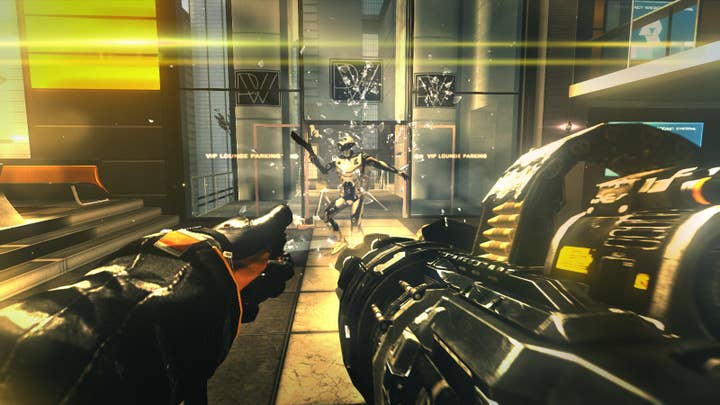Starbreeze: More To Life Than AAA
CEO Mikael Nermark on retaining Starbreeze's creative personality, the value of original IP, and the role of AAA in the studio's future
In a commercial sense, Starbreeze is one of AAA development's perennial underachievers.
Founded in 1998 in Uppsala, Sweden, the studio really grabbed the industry's attention with its 2004 Xbox exclusive The Chronicles of Riddick: Escape from Butcher Bay, which managed to turn a dubious IP into something approaching a masterpiece - slick, atmospheric, and a visual high-point for the generation. The Darkness followed in 2008, taking another relatively obscure property and bringing it to gruesome life with peerless style and an unexpectedly deft emotional touch.
The critics responded with high praise, but despite occupying a decidedly commercial niche - first-person games with a heavy focus on crunching violence and hard-bitten cool - the sales didn't follow. To be clear, both Riddick and The Darkness were far from failures, but the fact that sequels to both arrived five years later speaks volumes. Over time, the escalating respect for Starbreeze's work convinced the publishers to overlook their performance at market and bet on the continuing devotion of its fans.
Today, however, Starbreeze is a different place. In 2009, a cadre of the studio's founding members left to form a new company, MachineGames, and it was widely assumed that the Starbreeze responsible for these minor classics had left with them.
To some extent that may be true, but for the studio's current CEO Michael Nermark, who joined the company from GRIN around six months after their defection, the impact was more difficult to spot. Indeed, a major part of their legacy was an approach to creativity that kept most of the key decision-making within that elite group.

"Yes, they were the core team of the studio - they were seven people that helped found the studio - but it also made other people step up to take their place," he says. "The old way of making games is that a small group of people say, 'this is the game we want to make, this is the scope of the game,' and everyone else executes to the core group's expectations.
"Rather than get the people to execute the way they want and give them ownership, the core team do it themselves. What we brought into Starbreeze, the way we want to make games, is we want everyone to be a part of the daily work, and have ownership of a part of the game.
"When I came to Starbreeze they were doing it in the old-fashioned way, but when you take away such a big part - which those guys were - people do step up. We just had to adjust quite a bit more to actually fit the team that we had."
While its track record is hardly flawless, Starbreeze is notable for being one of the few developers with a recognisable style, and Nermark bristles at the suggestion that such fundamental ideas and techniques could disappear with the departure of just seven people. The core team that worked on its latest game, Syndicate, is composed the very same people that helped earn the studio its enviable reputation, and the proof is right there in the product.
"Syndicate was released in the midst of GAME going under; the retail space is hurting, and I think that hurt us because we were such a retail product"
Disappointingly, it's also there in the commercial performance. Syndicate is yet another quality Starbreeze release with obvious commercial appeal - from its respected IP to its celebrity voice-cast to its Skrillex soundtrack - and yet another Starbreeze release that has failed to find a substantial audience. Nermark is clearly pleased with the end result of his teams labour, but when pushed on its lacklustre performance he seems at a loss for words.
"There's so many reasons why a game succeeds or fails from a commercial point-of-view. We released the game about a month or more ago, and we're doing our post-mortem right now: what did we do right, what did we do wrong, and of course we will look at the commercial side as well.
"The numbers are not as high as we would like, and I think if you asked anyone they would say the same thing about any game they made. But [Syndicate] was released in the midst of GAME going under; the retail space is hurting, and I think that hurt us because we were such a retail product."
One thing is clear: Nermark is tired of the compromises attendant to the industry's AAA work-for-hire model. It is the reason why the studio had to reduce its headcount by 25 following the completion of Syndicate, and the descriptor Nermark keeps returning to is "broken." He encountered the perils of that approach in his previous role at GRIN, which closed its doors in 2009 following a string of under-performing licensed titles, but he believes Starbreeze is ideally placed to build a brighter future.
"If you look at any successful studio out there, they own IP, they have done their own games," he says. "Look at Valve, Epic, Crytek. They believed in their own ideas, they had a lot of passion for what they did, and they succeeded. To be a successful studio you have to take charge of your own destiny by owning your own IP.

"I don't think big publishers are resistant to new IP. They just want to see something new. We are always asking what innovation can we bring to games; what's new that we can bring to the table. We just need to try harder. If you look at AAA games today most are quite similar, and I think we can do much, much more."
The studio currently has two projects in development, both of which are original IP and neither of which are AAA in the traditional sense. The first, codenamed "Project 13", is based on an idea from the prominent Swedish film director, Josef Fares. It will be targeted at digital platforms like XBLA and PSN, and, if Nermark is to be believed, it will, "crush all the rules and conventions of game development."
"I can't tell you what it is yet, but it's something different," he says. "We need to push the envelope, and not only on tech, which the industry has done beautifully since it started, but also innovate in terms of game design. We don't even talk about games any more at the studio... We don't talk about games, we don't talk about genres, we just talk about building the best experience, whatever that means for that particular project."
"We should have started looking at free-to-play three years ago. In some sense we're behind the curve"
The other, codenamed "Cold Mercury", marks Starbreeze's first experiment with the increasingly popular free-to-play business model. Like Project 13, Nermark won't be drawn into discussion of the details, and like Project 13, Cold Mercury is significant of how independent studios like Starbreeze must react to the changing landscape of AAA development.
With retail channels closing and fragmenting and a smaller number of products taking the lion's share of AAA revenue, Starbreeze can no longer afford to base its future solely on blockbuster game development. Nermark believes that the studio's trademark style can be brought to bear on any platform, under any business model, but in the cold light of 2012 there really isn't a moment left to loose.
"We should have started looking at this three years ago," he admits. "In some sense we're behind the curve, so we built this whole research and development set-up, where I asked the guys, 'What kind of game do you want to make? What kind of business model do you want to work with? Go and do that.' And they came up with this idea, which is Cold Mercury, and we're looking at a freemium-like business model. But it's not a free-to-play business model totally. There's a twist to it."
"We're not going to leave AAA or hardcore gaming. That's what bought us into the industry and we love to do those. But to keep a sustainable business and to cater to the studio's needs, we want to broaden our experience and move into new areas. We need to understand the whole market, rather than just a part of it."

